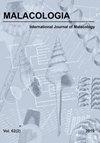Rudolph Amandus Philippi(1808-1904)的线虫学贡献
IF 1
4区 生物学
Q4 ZOOLOGY
引用次数: 12
摘要
Rudolph Amandus Philippi(在智利被称为Rodulfo Amando Philippi)是19世纪最长寿和最多产的孔雀学家之一,他的科学工作于19世纪30年代在德国开始,并一直持续到1904年在智利去世。Philippi对软体动物学做出了重大贡献:他描述了来自世界各地的近软体动物和化石的2500多个新分类群(2528种,40属,3科),特别是来自意大利和智利,并讨论了其他作者描述的许多分类群。Philippi最初在19世纪30年代主要发表来自欧洲的近代和化石软体动物,然后在19世纪40年代扩展到来自世界各地的海洋软体动物。1851年,菲利皮逃离德国革命,移民到智利。1853年,他成为圣地亚哥国立自然历史博物馆(Museo Nacional de Historia Natural)馆长,并成为智利大学教授。菲利皮移居智利后对malacology的贡献主要集中在智利的软体动物化石上。菲立比在许多其他动物分类群的系统分类学以及植物学方面也作出了重大贡献。在一篇配套论文(Kabat & Coan, 2017)中,我们对Philippi的生活和科学贡献进行了分析。本文对Philippi的线虫学出版物和分类群进行了编目。本文章由计算机程序翻译,如有差异,请以英文原文为准。
The Malacological Contributions of Rudolph Amandus Philippi (1808–1904)
ABSTRACT Rudolph Amandus Philippi (known in Chile as Rodulfo Amando Philippi), was one of the longest-lived and most prolific malacologists of the 19th century, as his scientific work began in Germany in the 1830s and continued unabated until his death in Chile in 1904. Philippi contributed significantly to malacology: he described over 2,500 new taxa of Recent and fossil molluscs from around the world (2,528 species, 40 genera and three families), particularly from Italy and Chile, and discussed numerous taxa described by other authors. Philippi initially published primarily on Recent and fossil molluscs from Europe in the 1830s, then expanded to marine molluscs from around the world by the 1840s. In 1851, Philippi escaped the German Revolution by emigrating to Chile, where in 1853 he became the director of what is now the Museo Nacional de Historia Natural (Santiago) and a professor at the Universidad de Chile. Philippi's contributions to malacology after his move to Chile were primarily on the fossil molluscs of Chile. Philippi also made significant contributions to the systematics of numerous other animal taxa as well as in botany. In a companion paper (Kabat & Coan, 2017), we provide an analysis of Philippi's life and scientific contributions. This paper catalogs Philippi's malacological publications and taxa.
求助全文
通过发布文献求助,成功后即可免费获取论文全文。
去求助
来源期刊

Malacologia
生物-动物学
CiteScore
2.00
自引率
0.00%
发文量
15
审稿时长
3 months
期刊介绍:
Malacologia publishes papers on all groups of the Mollusca. Malacologia specializes in publishing long papers and monographic treatments. Complete data are especially appreciated. Papers must be of interest to an international readership. Papers in systematics, ecology, population ecology, genetics, molecular genetics, evolution and phylogenetic treatments are especially welcomed. Also welcomed are letters to the editor involving papers published or issues of import to science of the day.
 求助内容:
求助内容: 应助结果提醒方式:
应助结果提醒方式:


